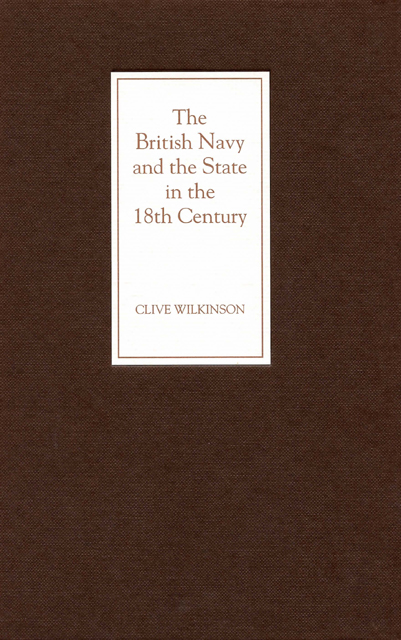Book contents
- Frontmatter
- Contents
- Foreword
- Acknowledgements
- Abbreviations
- 1 The Myth of a Paper Fleet
- 2 Government and the Navy
- 3 ‘Treating the House with Contempt’: British Naval Finance in the Eighteenth Century
- 4 Crisis and Victory: The Navy, 1714–62
- 5 The Peace Establishment I: Demobilization and Retrenchment, 1763–6
- 6 The Peace Establishment II: Stability, Innovation, and the Falklands, 1766–70
- 7 Sandwich, Parliament and the Paper Fleet, 1771–9
- 8 Conclusion
- Appendix 1 Extraordinary Estimates 1750–76
- Appendix 2 Extraordinary Estimate, Navy Office, 2 February 1767
- Appendix 3 Estimate of Monies Needed (ADM B 177, 5 August 1765)
- Appendix 4 ‘Plan of Expense of His Majesty’s Navy for the Year 1768’ (ADM B 181, 27 May 1768)
- Appendix 5 Account of the Course of the Navy (Fragment, ADM B 183, 6 August 1770)
- Appendix 6 A List of the Ships of the Royal Navy, 1 January 1763, with the Condition of the Navy on Survey (ADM 7 553)
- Appendix 7 British Battlefleet 1714–80
- Appendix 8 Environmental Impact on the Navy’s Ships, 1710–80
- Appendix 9 Naval Finance and Expenditure
- Appendix 10 The Procedure for Voting a Supply to the Navy
- Bibliography
- Index
7 - Sandwich, Parliament and the Paper Fleet, 1771–9
Published online by Cambridge University Press: 18 March 2023
- Frontmatter
- Contents
- Foreword
- Acknowledgements
- Abbreviations
- 1 The Myth of a Paper Fleet
- 2 Government and the Navy
- 3 ‘Treating the House with Contempt’: British Naval Finance in the Eighteenth Century
- 4 Crisis and Victory: The Navy, 1714–62
- 5 The Peace Establishment I: Demobilization and Retrenchment, 1763–6
- 6 The Peace Establishment II: Stability, Innovation, and the Falklands, 1766–70
- 7 Sandwich, Parliament and the Paper Fleet, 1771–9
- 8 Conclusion
- Appendix 1 Extraordinary Estimates 1750–76
- Appendix 2 Extraordinary Estimate, Navy Office, 2 February 1767
- Appendix 3 Estimate of Monies Needed (ADM B 177, 5 August 1765)
- Appendix 4 ‘Plan of Expense of His Majesty’s Navy for the Year 1768’ (ADM B 181, 27 May 1768)
- Appendix 5 Account of the Course of the Navy (Fragment, ADM B 183, 6 August 1770)
- Appendix 6 A List of the Ships of the Royal Navy, 1 January 1763, with the Condition of the Navy on Survey (ADM 7 553)
- Appendix 7 British Battlefleet 1714–80
- Appendix 8 Environmental Impact on the Navy’s Ships, 1710–80
- Appendix 9 Naval Finance and Expenditure
- Appendix 10 The Procedure for Voting a Supply to the Navy
- Bibliography
- Index
Summary
What has become of the Navy or what has become of the money granted for it? It is a plain question; the people of England expect an explicit answer!
Earl of Bristol, 23 April, 1779This question was asked in the House of Lords in 1779 on a motion to remove Lord Sandwich from the Admiralty. Sandwich was appointed to the Admiralty in early 1771, after the departure of Hawke. He inherited a fleet in good order, a fleet whose maintenance had been carefully co-ordinated and a Navy whose administration and finances had been well managed. When war had threatened with Spain over the Falkland Islands, the Navy was prepared, so well prepared, in fact, that war with the Bourbon powers was averted. In the years that followed the Falklands crisis and as war with Britain’s colonies in America escalated, the impression of the fine fleet inherited by Sandwich apparently evaporated. The Navy’s ships seemed to be in terminal decay. The Navy was administered by, it was alleged, corrupt ministers and officials more interested in lining their own pockets. The focus of this criticism, and contempt, was Lord Sandwich himself. No First Lord of the Admiralty before or since has been subject to so many accusations of dishonesty, corruption and mismanagement. These accusations generated such contempt among Sandwich’s contemporaries in the parliamentary opposition that history has recorded him, until quite recently, as being one of the prime architects of Britain’s loss of her American empire. However, an examination of Sandwich’s administration reveals a man who was without doubt one of the most competent and dedicated naval administrators of the eighteenth century, a view entirely at odds with the unjustified reputation that prevailed for so long.
There is a substantial amount of literature about Sandwich, much of it concerned with his use of patronage, his character and his part as a minister in a government engaged in an unpopular war. The twentieth-century publication of four volumes of the Sandwich papers by the Navy Records Society did much to re-evaluate his reputation. More recently, Knight, Haas and Broomfield, to name a few, have provided a more balanced assessment of Sandwich’s abilities as an administrator and his life has been entirely reassessed in the biography of the earl by Nicholas Rodger. Yet despite a much greater understanding of Sandwich and his management of the Navy, we are left with two unresolved issues.
- Type
- Chapter
- Information
- The British Navy and the State in the Eighteenth Century , pp. 165 - 208Publisher: Boydell & BrewerPrint publication year: 2004

